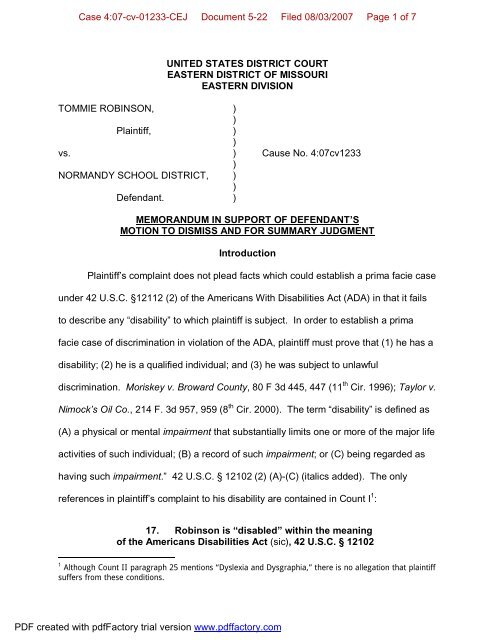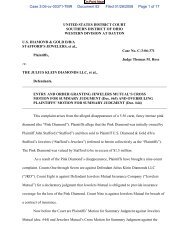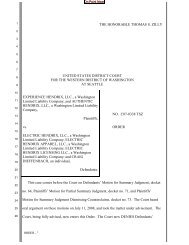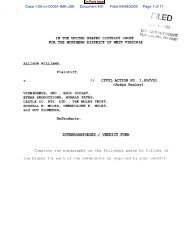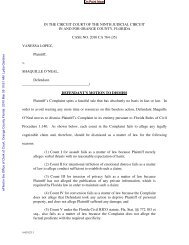Memo in Support of Motion to Dismiss, SJ - On Point News
Memo in Support of Motion to Dismiss, SJ - On Point News
Memo in Support of Motion to Dismiss, SJ - On Point News
You also want an ePaper? Increase the reach of your titles
YUMPU automatically turns print PDFs into web optimized ePapers that Google loves.
Case 4:07-cv-01233-CEJ Document 5-22 Filed 08/03/2007 Page 1 <strong>of</strong> 7<br />
UNITED STATES DISTRICT COURT<br />
EASTERN DISTRICT OF MISSOURI<br />
EASTERN DIVISION<br />
TOMMIE ROBINSON, )<br />
)<br />
Pla<strong>in</strong>tiff, )<br />
)<br />
vs. ) Cause No. 4:07cv1233<br />
)<br />
NORMANDY SCHOOL DISTRICT, )<br />
)<br />
Defendant. )<br />
MEMORANDUM IN SUPPORT OF DEFENDANT’S<br />
MOTION TO DISMISS AND FOR SUMMARY JUDGMENT<br />
Introduction<br />
Pla<strong>in</strong>tiff’s compla<strong>in</strong>t does not plead facts which could establish a prima facie case<br />
under 42 U.S.C. §12112 (2) <strong>of</strong> the Americans With Disabilities Act (ADA) <strong>in</strong> that it fails<br />
<strong>to</strong> describe any “disability” <strong>to</strong> which pla<strong>in</strong>tiff is subject. In order <strong>to</strong> establish a prima<br />
facie case <strong>of</strong> discrim<strong>in</strong>ation <strong>in</strong> violation <strong>of</strong> the ADA, pla<strong>in</strong>tiff must prove that (1) he has a<br />
disability; (2) he is a qualified <strong>in</strong>dividual; and (3) he was subject <strong>to</strong> unlawful<br />
discrim<strong>in</strong>ation. Moriskey v. Broward County, 80 F 3d 445, 447 (11 th Cir. 1996); Taylor v.<br />
Nimock’s Oil Co., 214 F. 3d 957, 959 (8 th Cir. 2000). The term “disability” is def<strong>in</strong>ed as<br />
(A) a physical or mental impairment that substantially limits one or more <strong>of</strong> the major life<br />
activities <strong>of</strong> such <strong>in</strong>dividual; (B) a record <strong>of</strong> such impairment; or (C) be<strong>in</strong>g regarded as<br />
hav<strong>in</strong>g such impairment.” 42 U.S.C. § 12102 (2) (A)-(C) (italics added). The only<br />
references <strong>in</strong> pla<strong>in</strong>tiff’s compla<strong>in</strong>t <strong>to</strong> his disability are conta<strong>in</strong>ed <strong>in</strong> Count I 1 :<br />
17. Rob<strong>in</strong>son is “disabled” with<strong>in</strong> the mean<strong>in</strong>g<br />
<strong>of</strong> the Americans Disabilities Act (sic), 42 U.S.C. § 12102<br />
1 Although Count II paragraph 25 mentions “Dyslexia and Dysgraphia,” there is no allegation that pla<strong>in</strong>tiff<br />
suffers from these conditions.<br />
PDF created with pdfFac<strong>to</strong>ry trial version www.pdffac<strong>to</strong>ry.com
Case 4:07-cv-01233-CEJ Document 5-22 Filed 08/03/2007 Page 2 <strong>of</strong> 7<br />
(2), because he has a impairment that substantially<br />
limits one or more <strong>of</strong> this major life activities <strong>in</strong> that he<br />
is unable <strong>to</strong> read at a first grade level.<br />
18. Based on the District’s conclusion that<br />
Rob<strong>in</strong>son could not read at a first grade level, the<br />
District regarded Rob<strong>in</strong>son as be<strong>in</strong>g disabled.<br />
(1) Paragraph 17 does not describe a disability, nor does it necessarily<br />
describe a symp<strong>to</strong>m <strong>of</strong> a disability 2 . The fact that “he is unable <strong>to</strong> read at a first grade<br />
level” by itself is not a legally recognized disability. Paragraph 18 is a conclusion that<br />
the District knew pla<strong>in</strong>tiff was illiterate and therefore it “regarded him as be<strong>in</strong>g disabled.”<br />
That conclusion is not supported by case law. (2) As a factual matter, the District did<br />
not have actual or constructive knowledge that pla<strong>in</strong>tiff had an impairment or claimed <strong>to</strong><br />
be disabled.<br />
I.<br />
Illiteracy is not a “disability” unless<br />
it is a result <strong>of</strong> a physical or mental impairment.<br />
To constitute an actual disability (as opposed <strong>to</strong> a “perceived” disability), a<br />
claimant must exhibit (1) “a physical or mental impairment,” which (2) “substantially<br />
limits one or more <strong>of</strong> the major life activities <strong>of</strong> such <strong>in</strong>dividual.” 42 U.S.C. 12102 (2)<br />
(A)-(C). Numerous cases have determ<strong>in</strong>ed that, without a medical cause, illiteracy is<br />
not a “physical or mental impairment” and therefore is not a disability. 3<br />
A sem<strong>in</strong>al case <strong>in</strong> the determ<strong>in</strong>ation that illiteracy is not, by itself, a disability is<br />
Moriskey v. Broward County, 80 F. 3d 445 (11 th Cir. 1996). In that case, a job applicant<br />
notified a prospective employer she had taken special education courses and could not<br />
2 See discussion <strong>of</strong> “symp<strong>to</strong>ms” <strong>in</strong> Part II and footnote 4.<br />
3 The case <strong>of</strong> Willis v. Barnes-Jewish Hospital, 2007 U.S. Dist. LEXIS 1669 recognizes that illiteracy can be<br />
a disability only if caused by a “physical or mental” impairment and that if a disability exists the employee<br />
must have been term<strong>in</strong>ated “because <strong>of</strong>” his disability.<br />
PDF created with pdfFac<strong>to</strong>ry trial version www.pdffac<strong>to</strong>ry.com<br />
2
Case 4:07-cv-01233-CEJ Document 5-22 Filed 08/03/2007 Page 3 <strong>of</strong> 7<br />
read or write. Based upon her illiteracy, she was denied the job. Cit<strong>in</strong>g Jones v.<br />
Bowen, 660 F. Supp. 1115, 1121 (C.D. Ill 1989) the Court said: “While illiteracy is a<br />
serious problem, it does not always follow that someone who is illiterate is necessarily<br />
suffer<strong>in</strong>g from a physical or mental impairment.” 80 F. 3d at page 448.<br />
This <strong>of</strong>t cited case derives from a l<strong>in</strong>e <strong>of</strong> cases deal<strong>in</strong>g with disabilities which are<br />
not visible or apparent <strong>to</strong> an employer. To establish a violation <strong>of</strong> the ADA, the claimant<br />
must show that the employer knew (or should have known) <strong>of</strong> the disability.<br />
II.<br />
A physical or mental impairment must be known<br />
by an employer <strong>in</strong> order <strong>to</strong> trigger ADA liability.<br />
In addition <strong>to</strong> the rule that illiteracy have an underly<strong>in</strong>g cause <strong>to</strong> be actionable<br />
under the ADA, there is an essential requirement that such impairment be known by the<br />
employer. In Hedberg v. Indiana Bell Tel. Co. 47 F 3d 928, 931-34 (7 th Cir. 1995), the<br />
court reviewed term<strong>in</strong>ation <strong>of</strong> an employee whose “symp<strong>to</strong>ms” were known by the<br />
employer. 4<br />
In Hedberg, the employee contended that the employer should have known<br />
about his disability because the employer was aware <strong>of</strong> his symp<strong>to</strong>ms.<br />
Hedberg, despite the forego<strong>in</strong>g, argues that his employer’s<br />
actual knowledge <strong>of</strong> the disability is irrelevant <strong>in</strong> his case.<br />
He ma<strong>in</strong>ta<strong>in</strong>s that fir<strong>in</strong>g someone “because <strong>of</strong>” the symp<strong>to</strong>ms<br />
<strong>of</strong> his disability is the same as fir<strong>in</strong>g him “because <strong>of</strong>” the<br />
disability itself. Under this theory, even if the employer knew<br />
noth<strong>in</strong>g about the disability, if he knew <strong>of</strong> the symp<strong>to</strong>ms and<br />
fired the employee because <strong>of</strong> them, the ADA b<strong>in</strong>ds him…<br />
Hedberg claims that Indiana Bell’s fir<strong>in</strong>g him because <strong>of</strong><br />
symp<strong>to</strong>ms <strong>of</strong> his disability is exactly the same as fir<strong>in</strong>g him<br />
because <strong>of</strong> his disability. 47 F. 3d at page 933.<br />
The court rejected the employee’s contention as follows:<br />
An employer cannot be liable under ADA for fir<strong>in</strong>g an<br />
employee when it <strong>in</strong>disputably had no knowledge <strong>of</strong> the<br />
4 In our case, if a genu<strong>in</strong>e disability existed, illiteracy would, at most, be a “symp<strong>to</strong>m” <strong>of</strong> the disability.<br />
PDF created with pdfFac<strong>to</strong>ry trial version www.pdffac<strong>to</strong>ry.com<br />
3
Case 4:07-cv-01233-CEJ Document 5-22 Filed 08/03/2007 Page 4 <strong>of</strong> 7<br />
disability… At the most basic level, it is <strong>in</strong>tuitively clear when<br />
view<strong>in</strong>g the ADA’s language <strong>in</strong> a straightforward manner that<br />
an employer cannot fire an employee “because <strong>of</strong>” a<br />
disability unless it knows <strong>of</strong> the disability. If it does not know<br />
<strong>of</strong> the disability, the employer is fir<strong>in</strong>g the employee<br />
“because <strong>of</strong>” some other reason. (emphasis added) 47 F. 3d<br />
at page<br />
The Hedberg analysis has been recognized and adopted by the Eighth Circuit <strong>in</strong><br />
Miller v. National Casualty, 61 F. 3d 627, 629 (8 th Cir. 1995) as follows:<br />
Before an employer must make accommodation for the<br />
physical or mental limitation <strong>of</strong> an employee, the employer<br />
must have knowledge that such a limitation exists. The<br />
Interpretive Guidance <strong>of</strong> Title I <strong>of</strong> the ADA states that “an<br />
employer [is not] expected <strong>to</strong> accommodate disabilities <strong>of</strong><br />
which it is unaware.” 29 C.F.R. app. §1630.9 (1994). The<br />
logic <strong>of</strong> this proposition is overwhelm<strong>in</strong>g and has been<br />
affirmed repeatedly by other courts constru<strong>in</strong>g both the ADA<br />
and the Rehabilitation Act <strong>of</strong> 973. In general, “it is the<br />
responsibility <strong>of</strong> the <strong>in</strong>dividual with a disability <strong>to</strong> <strong>in</strong>form the<br />
employer that an accommodation is needed.” (Citations<br />
omitted.)<br />
Cit<strong>in</strong>g Hedberg, the Court <strong>in</strong> Miller said “the ADA does not require<br />
clairvoyance…” on the part <strong>of</strong> an employer. The fact that an employer did not know <strong>of</strong> a<br />
disability until after the employment was term<strong>in</strong>ated makes it “impossible for the<br />
company <strong>to</strong> have made the disability the basis for the term<strong>in</strong>ation.” 61 F 3d at page 630.<br />
states:<br />
III.<br />
Count II fails <strong>to</strong> state a cause <strong>of</strong> action<br />
<strong>in</strong> that it does not describe a disability applicable<br />
<strong>to</strong> pla<strong>in</strong>tiff or <strong>to</strong> any other employee <strong>of</strong> defendant.<br />
a. “Basic literacy requirement.”<br />
The basis <strong>of</strong> pla<strong>in</strong>tiff’s claim under Count II is set forth <strong>in</strong> paragraph 25 which<br />
PDF created with pdfFac<strong>to</strong>ry trial version www.pdffac<strong>to</strong>ry.com<br />
4
Case 4:07-cv-01233-CEJ Document 5-22 Filed 08/03/2007 Page 5 <strong>of</strong> 7<br />
25. The District’s “basic literacy skills requirement”<br />
has a disparate impact on <strong>in</strong>dividuals with learn<strong>in</strong>g<br />
disabilities such as Dyslexia and Dysgraphia, <strong>in</strong> that the<br />
District’s “basic literacy skills requirement” disqualifies<br />
<strong>in</strong>dividuals with learn<strong>in</strong>g disabilities at a higher rate than<br />
<strong>in</strong>dividuals without learn<strong>in</strong>g disabilities.<br />
That this paragraph conta<strong>in</strong>s only conclusions will be addressed <strong>in</strong> part b <strong>of</strong> this<br />
section III. Before that discussion, defendant notes that the cause <strong>of</strong> action purported<br />
by Count II is not recognizable <strong>in</strong> law. The premise <strong>of</strong> Count II is that a “basic literacy<br />
requirement” for employees <strong>of</strong> a school district is discrim<strong>in</strong>a<strong>to</strong>ry because it fails <strong>to</strong><br />
provide persons with disabilities equal protection. The logic <strong>of</strong> Count II would <strong>in</strong>validate<br />
any literacy requirement imposed by any employer upon employees or perspective<br />
employees. The ADA provides relief from employment requirements which are burdens<br />
for persons with recognizable disabilities. It does not <strong>in</strong>validate reasonable job<br />
requirements. As stated <strong>in</strong> part I <strong>of</strong> this memorandum, illiteracy is not per se a disability.<br />
Paragraph 25 describes the “basic literacy skills requirement” <strong>of</strong> the Normandy<br />
School District from the view <strong>of</strong> a hypothetical employee who has “Dyslexia or<br />
Dysgraphia.” There is no allegation or <strong>in</strong>dication that pla<strong>in</strong>tiff suffers from either <strong>of</strong><br />
these impairments or that any employee or prospective employee <strong>of</strong> the school district<br />
is so disabled. To state a cause <strong>of</strong> action under the ADA, pla<strong>in</strong>tiff must allege that “he is<br />
disabled” or that he was so regarded by his employer. Willis v. Barnes-Jewish Hospital,<br />
2007 U.S. Dist. LEXIS 1669.<br />
b. Mere conclusions will not state a claim.<br />
To survive a summary judgment, pla<strong>in</strong>tiff must plead and prove specific facts.<br />
Conclusory allegations will not suffice. Scheerer v. Potter, 443 F. 3d 916, 919 (7 th Cir.<br />
2006), Mart<strong>in</strong> v. Discount Smoke Shop, 443 F. Supp 2d 981 (CD Ill. 2006). Mere<br />
PDF created with pdfFac<strong>to</strong>ry trial version www.pdffac<strong>to</strong>ry.com<br />
5
Case 4:07-cv-01233-CEJ Document 5-22 Filed 08/03/2007 Page 6 <strong>of</strong> 7<br />
allegations which are not supported by specific facts are not enough <strong>to</strong> withstand a<br />
motion for summary judgment. Baucom v. Holiday Cos., 428 F. 3d 764, 768 (8 th Cir<br />
2005).<br />
Even if pla<strong>in</strong>tiff’s conclusions were supported by facts, Count II presents a non<br />
sequitur with regard <strong>to</strong> the Americans With Disabilities Act. The “basic literacy skills<br />
requirement” by def<strong>in</strong>ition screens out people who are illiterate. Recognized studies are<br />
<strong>in</strong> agreement that many causes exist for illiteracy, a good portion <strong>of</strong> which have noth<strong>in</strong>g<br />
<strong>to</strong> do with “physical or mental impairment.” 5<br />
Persons hav<strong>in</strong>g dyslexia and dysgraphia may have disabilities 6 but Count II does<br />
not identify any such <strong>in</strong>dividuals nor does it allege that defendant has taken any adverse<br />
action <strong>to</strong>ward them. The ADA does not prevent an employer from requir<strong>in</strong>g job<br />
qualifications; it merely provides protection for disabled <strong>in</strong>dividuals who may not meet<br />
the qualifications but can otherwise do the job.<br />
Conclusion<br />
In accordance with the standards <strong>of</strong> Celotex Corp. v. Catrett, 477 U.S. 317, 312,<br />
106 S. Ct. 2552, 91 A. Ed. 2d 265 (1986), defendant is entitled <strong>to</strong> summary judgment.<br />
5 See, National Center for Education Statistics, National Assessment <strong>of</strong> Adult Literacy (NAAL) report “A<br />
First Look at the Literacy <strong>of</strong> American Adults <strong>in</strong> the 21 st Century.” U.S. Department <strong>of</strong> Education and ADA<br />
Title III Technical Assistance Manual, III-2.0000 regula<strong>to</strong>ry reference 28 CFR 36.104 “…disadvantages<br />
attributable <strong>to</strong> environmental, cultural, or economic fac<strong>to</strong>rs are not the type <strong>of</strong> impairments covered by<br />
Title III.”<br />
6 Such conditions must meet the “substantiality limits” test <strong>of</strong> 42 U.S.C. 12102(2) and 29 CFR<br />
§1602(j)(I)(i) <strong>to</strong> be def<strong>in</strong>ed as a “disability.”<br />
PDF created with pdfFac<strong>to</strong>ry trial version www.pdffac<strong>to</strong>ry.com<br />
6
Case 4:07-cv-01233-CEJ Document 5-22 Filed 08/03/2007 Page 7 <strong>of</strong> 7<br />
Respectfully submitted,<br />
Crotzer, Ford & Ormsby<br />
__Darold E. Crotzer Jr.<br />
Darold E. Crotzer, Jr. (Fed. Bar 2902)<br />
Charles L. Ford (Fed. Bar 3123)<br />
222 S. Central Avenue Suite 500<br />
Clay<strong>to</strong>n, MO 63105<br />
Phone (314) 726-3040<br />
Fax (314) 726-5120<br />
PDF created with pdfFac<strong>to</strong>ry trial version www.pdffac<strong>to</strong>ry.com<br />
7


